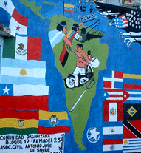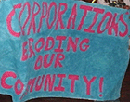
Nagorno-Karabakh: The Long Shadow of Joseph Stalin
The president of Azerbaijan, Ilhan Aliyev, son of the long-time president Heydar Aliyev and Robert Kocharian, president of Armenia, met outside Paris, in Rambouillet February 10-11, 2006 to discuss the stalemated conflict over Nagorno-Karabakh. Rambouillet had also been the scene for the last-chance negotiations on Kosovo just before the NATO bombing of Serbia began in 1999.




